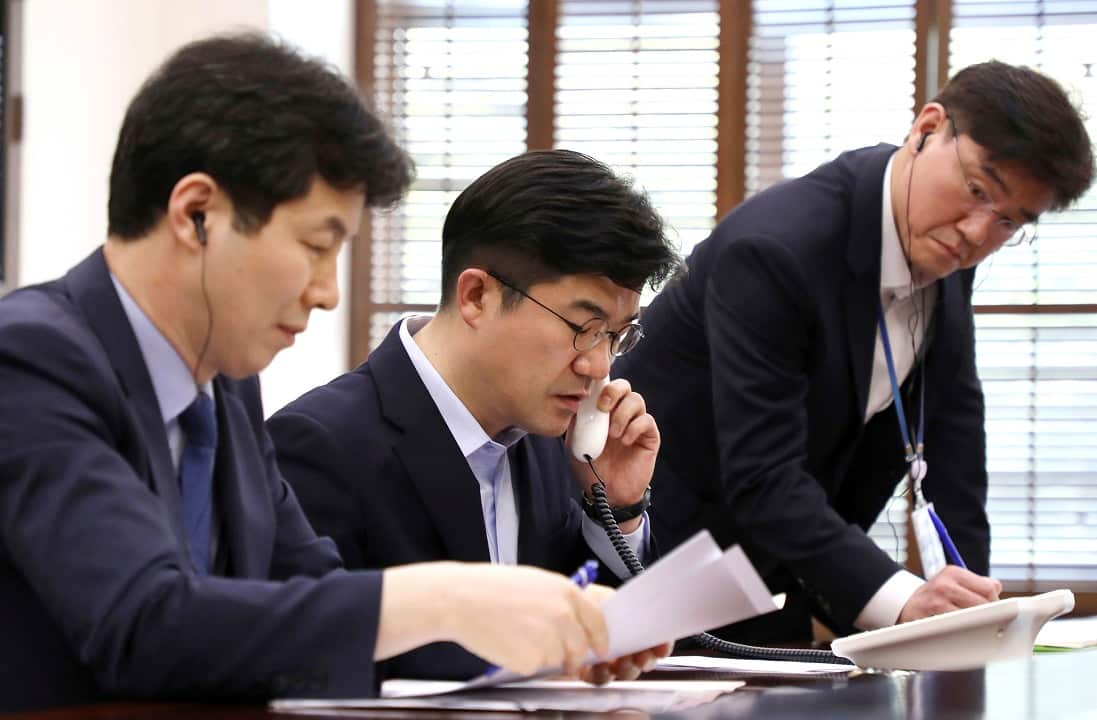The line links the presidential Blue House in Seoul with the Pyongyang office of the nuclear-armed North's State Affairs Commission, which Kim chairs - one of his most important titles.
"The historic connection of the hotline between the leaders of the two Koreas has just been established," said senior Blue House official Youn Kun-young, adding that a test conversation between officials lasted 4 minutes and 19 seconds.

"The connection was smooth and the quality of connection was also very good," he said. "It felt like talking to a neighbour."
Geographically the two are next door to each other, but the peninsula has been divided for 70 years, with no post or telephone communications between them for ordinary civilians since the end of the Korean War in 1953.
The hotline, which enables direct communications between Kim and Moon, is the latest step in a whirlwind of diplomacy on and around the Korean peninsula, triggered by the Winter Olympics in the South.
The two leaders are due to meet on Friday on the southern side of the DMZ, in what will be only the third inter-Korean summit since war ended with an armistice rather than a peace treaty, leaving them technically still in a state of conflict.
Seoul is pushing for a declaration that the war is over as a prelude to the signing of a treaty, with Moon declaring Thursday it was a goal that "must be pursued".
US President Donald Trump, who is expected to hold his own much-anticipated summit with Kim later, previously offered his "blessing" for the two Koreas to discuss a treaty.
Everything hinges, though, on the question of the North's nuclear weapons.
Pyongyang - which last year carried out its most powerful nuclear test to date and launched intercontinental ballistic missiles capable of reaching the United States - has long insisted that it needs them to defend against a US invasion.
It has since offered to negotiate over them in exchange for security guarantees, but the phrase sometimes used, denuclearisation of the Korean peninsula, has long been code for the withdrawal of US troops in the South and the end of its nuclear umbrella over its security ally - something unthinkable in Washington.
The US, on the other hand, is adamant that it will accept nothing less than the North's complete, verifiable and irreversible denuclearisation.
'New stage'
Trump warned this week that his summit with Kim could still be called off, saying: "If I think that it's a meeting that is not going to be fruitful, we're not going to go.
"If the meeting, when I'm there, is not fruitful, I will respectfully leave the meeting."
Moon said Thursday that the North had shown "a willingness for a complete denuclearisation", and had not demanded the withdrawal of US troops.
"They are only talking about a security guarantee of its own," he said, but added that "the devil is in the details" and it was "too early to guarantee the success of dialogue", which could only come "after a successful US-North Korea summit".
For its part the North has been reticent about the process, making its first official reference to contacts with the US only last week, when the official KCNA news agency said Kim discussed "the prospect of the DPRK-US dialogue".
But for more than a month KCNA has hardly mentioned the North's nuclear capabilities either.
The ruling Workers' Party of Korea was holding a full meeting of its central committee Friday to discuss a "new stage" in what it called "the important historic period of the developing Korean revolution".
But it was considered unlikely to issue clear details of any change in policy.
The hotline opened Friday is not the first between North and South - a military link was reopened in January after two years in abeyance, as one of the early confidence-building steps in the process.

